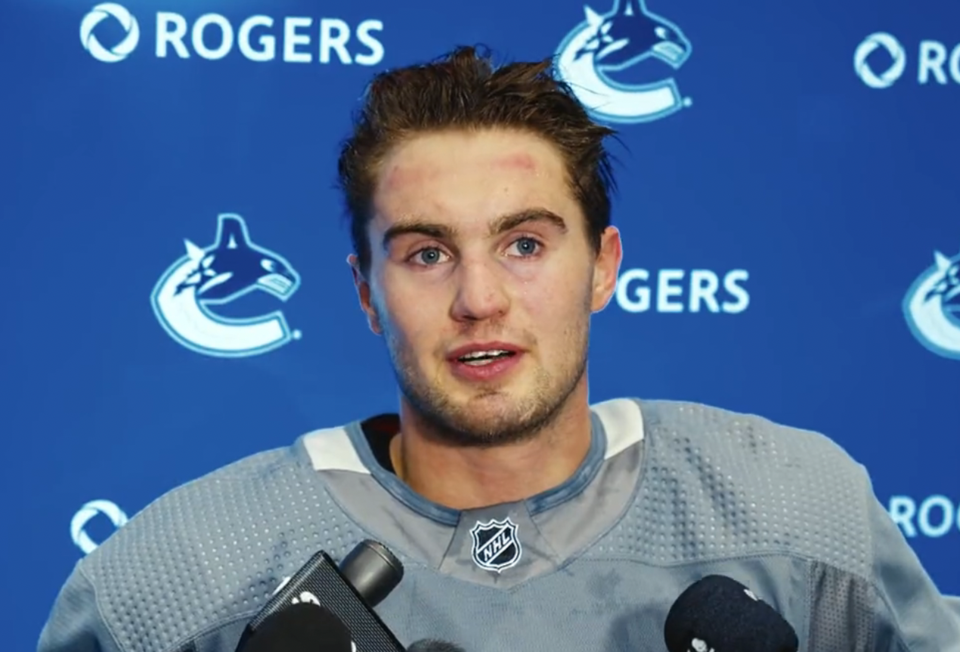Nils Höglander is one of the most efficient goalscorers in the NHL this season.
The 22-year-old winger is averaging the lowest ice time on the Vancouver Canucks this season, playing just 10:37 per game. Despite that limited ice time, Höglander is second on the Canucks in 5-on-5 goals with seven — one goal behind Ilya Mikheyev, who scored his eighth 5-on-5 goal on Saturday just after a Canucks power play expired.
That’s a 24-goal pace for Höglander, which is pretty solid production for someone getting fourth-line minutes and no power play time. When you compare him to the rest of the NHL, Höglander’s 1.78 goals per 60 minutes at 5-on-5 is actually in the top ten, just a little behind the likes of Connor Bedard, Alex DeBrincat, Artemi Panarin, and Ilya Mikheyev again.
That kind of production, as well as the dogged determination he has shown on the forecheck and in board battles this season, is enough to make one think that Höglander deserves to get more ice time.
Canucks head coach Rick Tocchet agrees.
"We've got to get his hockey IQ up a little bit."
In an interview with Don Taylor and Rick Dhaliwal on ChekTV, Tocchet explained why Höglander’s ice time has been limited to start the season, pointing to the defensive side of the ice and his positioning.
“He’s an interesting guy. I really like Höggy. We’ve got to get his hockey IQ up a little bit,” said Tocchet. “Hashmarks down, I really like his game.”
The issue comes in the defensive zone and Tocchet suggested that Höglander’s defenders might be leaning too much on one particular source.
“Big analytics town around here,” said Tocchet. “I do like analytics but you’ve got to be careful. I’m an eye test guy. With Höggy, I’ve got to learn to trust him in certain situations, make sure he’s in certain spots.”
Following up shortly after, Don Taylor quipped, “If you’re looking for a deep dive on analytics, you’ve got the wrong show. We’re not that smart.”
“I’m not either,” the quick-witted Tocchet replied. “It’s funny because I do like analytics in its place and it’s important but I think sometimes you’ve got to be careful because sometimes you read analytics and you’re like, ‘Really? They had this guy playing a great game or this guy playing a bad game?’ You have to have the eye test. We use analytics but we don’t overblow it; it’s kind of a happy medium.”
Perhaps Tocchet should give analytics a little more credence when it comes to Höglander. As much as he’s scoring goals and causing some havoc in the offensive end of the ice, some analytics do reveal some defensive deficiencies.
Among the Canucks’ regular forwards, Höglander has the fourth-highest rate of expected goals against: 2.80 xGA/60, according to Natural Stat Trick. The three forwards with a higher rate of expected goals against are Phil Di Giuseppe, Brock Boeser, and J.T. Miller, who have the excuse of playing a match-up role against the opponents’ top line night-in, night-out.
On the fourth line, on the other hand, Höglander gets some of the easiest match-ups on the Canucks, so those defensive numbers are a legitimate concern. Höglander’s defensive game hasn’t hurt the team just yet — the Canucks have out-scored their opponents 14-to-4 with Höglander on the ice at 5-on-5 — but that’s primarily because the Canucks’ goaltending has been outstanding behind him.
Power play is key to getting Höglander more minutes
Still, Tocchet agrees that he has to get Höglander on the ice more often.
“When he’s forechecking and being a pest, he deserves some more time,” said Tocchet. “And I will tell you, he does deserve more time. Unfortunately, he doesn’t penalty kill. I might actually start to get him on the power play on the second unit to get him more minutes.”
With Anthony Beauvillier traded away, there’s a spot available on the second power play unit, possibly two if Andrei Kuzmenko gets bumped back up to the first unit at some point.
On Saturday against the Calgary Flames, however, AHL call-up Linus Karlsson was placed on the second unit ahead of Höglander, despite just two power play points — both assists — in 17 games for the Abbotsford Canucks this season.
Given Höglander’s production at 5-on-5 and his clear offensive skill, it’s surprising that Höglander wasn’t already getting used on the second unit.
But beyond potentially getting a bit more scoring out of Höglander, Tocchet thinks getting him on the power play will have an additional benefit to his game.
“I think that will help get him going a little bit where he doesn’t have to sit on the bench for five minutes,” said Tocchet. “Hopefully, if he plays that second unit, he will get those extra minutes and probably get in the flow of the game a lot quicker. It is hard to sit on the bench for five-six minutes when there’s power play and penalty kill and then you’re probably the third rotation guy to go out there, so that’s about four or five minutes. That’s tough on a player.”
Tocchet has previously praised Höglander for the way he’s able to come off the bench and contribute even when special teams situations have kept him out for long stretches.
“What I like about him, he sat on the bench for a period of time and to come out there and give us energy, that’s where I’m impressed,” said Tocchet after a game against the St. Louis Blues. “That’s hard. You sit on the bench, your legs are tight, and for him to do that, I was impressed.”




